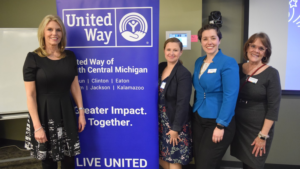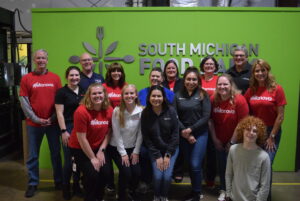
Editor’s Note: On this Labor Day, President & CEO Chris Sargent offers insights on the economic struggles of ALICE households – Asset Limited, Income Constrained, Employed.

They say a rising tide lifts all boats. While that might be true at the seashore, it doesn’t describe the experience of hard-working families that struggle to make ends meet.
As we celebrate America’s workers this Labor Day, United Way of South Central Michigan is urging leaders from the boardroom to the State Capitol to make sure all boats have the chance to rise with the economic tide.
Sadly, there are two starkly different economic realities in America. There’s one in which middle- and high-wage workers saw savings and wealth increase throughout the pandemic. And there’s another for those working in low-income jobs, whose wages stagnated over 15 years. These essential workers were locked out of the economic booms and are still reeling from another battering sustained during the pandemic.
ALICE workers were always living here and delivering for us – as our child care professionals, home health aides, delivery workers and more. Though they earn above the Federal Poverty Level, their wages are not enough to cover the rising costs of housing, food, child care, health care, transportation and a smartphone – the essentials needed in today’s modern economy.
The outdated and incomplete measurements our country uses to document financial hardship have distorted how we understand the challenges facing these hard-working, tax-paying Americans as they strive for financial stability.
The poverty level vastly underestimates how many households are experiencing hardship. Michigan’s latest ALICE report, produced with our research partner United For ALICE, demonstrates that in addition to nearly 54,000 households in poverty in our six-county region, another 107,000 households simply couldn’t earn enough to afford the basics. Households of Black, Indigenous and other people of color (BIPOC) face even greater hardship, with up to 60% falling below the ALICE Threshold due to centuries of racially discriminatory and inequitable systems.
And while the Consumer Price Index (CPI) is a valuable economic tool, it doesn’t tell the full story of the impact of rising costs on ALICE. CPI measures inflation by tracking the cost of more than 200 goods and services, including luxury items. But ALICE families don’t buy luxury items. They’re just trying to feed their families, live in a safe neighborhood and access quality, affordable child care.
That’s why United For ALICE recently debuted a companion inflation index, the ALICE Essentials Index, which shows that the cost of essentials rose at a far faster rate than the CPI lets on. Low-wage jobs aren’t close to keeping pace.
Relying solely on CPI to determine increases in the poverty level, Social Security, Medicaid and nutrition supports such as the Supplemental Nutrition Assistance Program (SNAP) has had damaging consequences, leaving many without a safety net in the face of an emergency.
Our United Way is showing up for ALICE. Our local partnerships, funding and initiatives – from Voluntary Income Tax Assistance to business grants for BIPOC-owned businesses – are helping. But filling the gap requires a collective, concerted effort. If we are united in purpose for our essential workers, together we can create the supports that allow all ships to rise and set sail for a brighter future.
And there’s no better way to celebrate America’s workers than that.
The Michigan ALICE Report is made possible by the support of the Consumers Energy Foundation, Michigan Association of United Ways, and local United Ways statewide. Learn more about ALICE families in UWSCMI’s local communities at unitedforscmi.org/alice.










